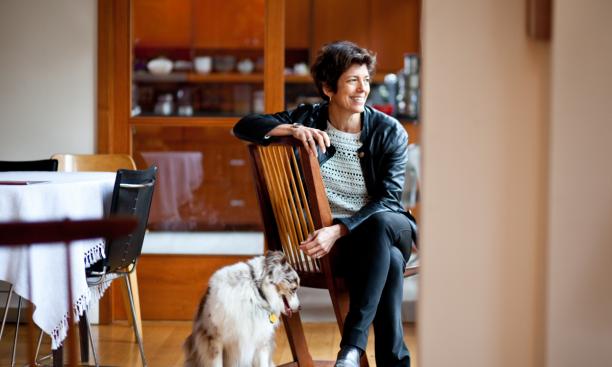
Nancy Rappaport ’82 has devoted her entire career to medicine. A child psychiatrist and associate professor at Harvard Medical School, she’s worked in the Cambridge, Mass., public school system for over two decades. Rappaport says her specialty is “angry teenagers” — and something about her hearty laugh says she doesn’t usually have trouble keeping up.
In August 2015, she was diagnosed with early-stage breast cancer. With three children of her own — one currently in med school — the longtime runner (13 Boston Marathons and counting) says she was stopped in her tracks.
“That transition — going from a doctor to a patient — has really opened me up,” she says. “For me, it was early-stage breast cancer. For other people, it could be a mild heart attack, or a major depression. Those things are relatively common for doctors to manage, but still, it can feel like earth-shattering news.”
Rappaport recalls her treatment as rapid, rattling off dates and procedures with precision: “Stage 0” breast cancer required a lumpectomy (four weeks after diagnosis), a mastectomy (two weeks later), and post-op healing at home. She says she is now “100 percent recovered.”
As a patient, Rappaport watched her recovery from the other side of the hospital curtain. Though she knew her medical tests revealed “what can seem like a relatively benign diagnosis,” she felt her own emotions take over.
Rappaport began to think about cancer from a profoundly personal point of view — and her complex, contradicting emotions surprised her.
“When a lot of people talk about cancer survivors, they talk about strength and resilience. This play is about more than that.”
Nancy Rappaport ’82
“There’s this fluctuation between an outpouring of love that people may show you … and then, there’s the sense of overwhelming loneliness,” she says.
To cope, Rappaport began writing emails to close friends and family. As she gathered strength, she began taking long walks in Mount Auburn Cemetery, a National Historic Landmark in Cambridge.
Over the past year, the poems and reflections she sent from her bed in recovery evolved into Regeneration, her first work of drama. Rappaport wrote and produced the one-woman show, a mix of poetry and monologue, during her recovery from cancer.
“When a lot of people talk about cancer survivors, they talk about strength and resilience,” says Rappaport. “This play is about more than that.” Instead, Regeneration’s focus is the “big” questions — including mortality.
“How do you find strength in vulnerability? How do you face your deepest fears? How do you find a way through without nice, easy answers?” Rappaport asks.
An English major at Princeton, Rappaport has turned to writing in other times of trauma, including a 2009 memoir, In Her Wake: A Child Psychiatrist Explores the Mystery of Her Mother’s Suicide.
“I wanted to be an English major in pre-med, because my dream was to be a writer — but I also wanted to have a day job,” she remembers. She cites poet Wallace Stevens, an insurance executive, and poet William Carlos Williams, a doctor, as inspiration.
“When William Carlos Williams would write poetry, he would write it on his prescription pads,” she says. “And I thought that really taking care of patients is hearing people’s stories.”
Rappaport will perform Regeneration at Mount Auburn Cemetery’s Story Chapel in Cambridge, Mass., Oct. 1 and 2 at 3 p.m. (October is National Breast Cancer Awareness Month). Tickets, which benefit the nonprofit Friends of Mount Auburn, are available online. Another show is scheduled at the Irvington Town Hall Theater’s Stage Door Reading Series in Irvington, N.Y., on Oct. 16 at 3 p.m. For more info, visit the Facebook event or the Irvington Theater’s website.
